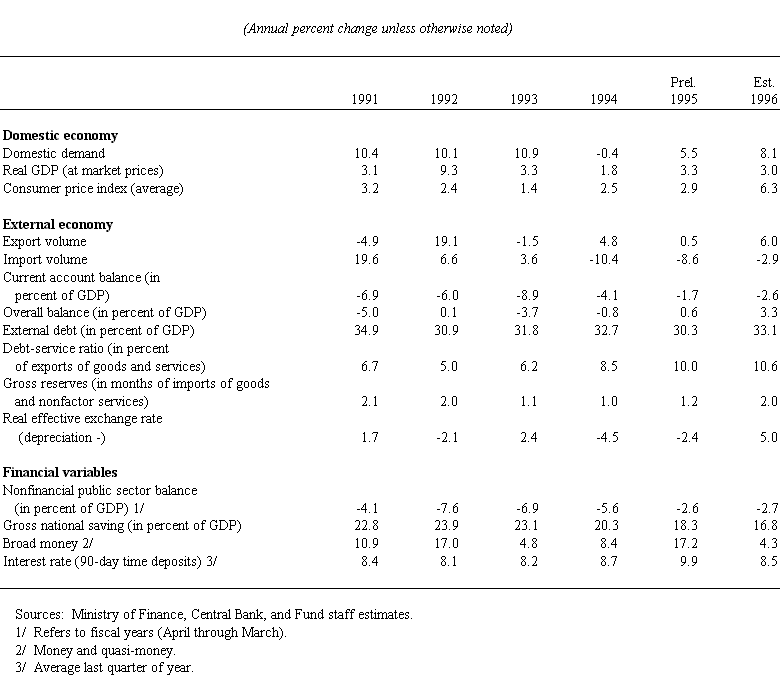Press Information Notice: IMF Concludes Article IV Consultation with Belize
June 5, 1997
| Public Information Notices (PINs) are issued, (i) at the request of a member country, following the conclusion of the Article IV consultation for countries seeking to make known the views of the IMF to the public. This action is intended to strengthen IMF surveillance over the economic policies of member countries by increasing the transparency of the IMF's assessment of these policies; and (ii) following policy discussions in the Executive Board at the decision of the Board. |
The IMF Executive Board on May 12, 1997 concluded the 1997 Article IV consultation1 with Belize.
Background
Belize’s economic performance weakened in 1991–94 as public sector savings fell sharply. Real gross domestic product (GDP) slowed to an average of 4.5 percent in 1991-94 (10 percent a year in 1987-90). Despite a cut in capital outlays and in the deficit during this period the central government relied heavily on domestic financing, particularly from the central bank, to minimize reliance on external financing. The authorities tightened credit policies and the resulting high real domestic interest rates crowded out private sector credit. In addition the slower growth in the agricultural sector was compounded by the effect of the recall in 1994 of most of the UK military contingent that had been posted in Belize, and minimal expansion in construction. Inflation remained in line with international trends, reflecting the peg of the Belize dollar to the U.S. dollar and the openness of the economy. Gross reserves fell from the equivalent of three months of imports in the late 1980s to one month at end–1994.
Some corrective measures were adopted during FY 1995/96 (April–March) including a reduction of 9 percent in the civil service in December 1995. However, the effect of these measures was offset by a weak revenue performance associated with tax incentives, and a wage increase granted to civil servants in late 1996. As a result, in FY 1995/96–1996/97 public sector savings remained at an average of about 4 percent of GDP. Nonetheless, capital outlays were reduced, and the public sector deficit narrowed from 5.5 percent of GDP in FY 1994/95 to an average of 2.5 percent of GDP in FY 1995/96–1996/97. In 1996, a loan from bilateral sources together with a tight credit policy, permitted a recovery of gross international reserves to the equivalent of two months of imports. The external current account deficit increased to 2½ percent of GDP in 1996 (1¾ percent in 1995) as a decline in the service account’s surplus, associated with a fall in tourism and the withdrawal of the remaining contingent of UK troops stationed in Belize, more than offset an imrovement in the trade balance reflecting a recovery of agricultural exports. Real GDP growth was 3 percent on the strength of agricultural production, while the rise in consumer prices peaked at 6.3 percent mainly reflecting the introduction of the value added tax at a 15 percent rate. Inflation has decelerated to 4¾ percent as of February 1997.
Executive Board Assessment
Executive Directors observed that the fiscal measures adopted by the authorities in 1995/96, particularly the retrenchment of a significant part of the civil service, had been important steps toward correcting Belize's fiscal imbalance. However, fiscal imbalances and domestic financing requirements remained large. Directors emphasized that exceptional external financing, such as the country received last year, could only provide temporary relief and could not be a substitute for fiscal measures to redress Belize's macroeconomic imbalances on a sustainable basis.
Accordingly, Directors viewed a further strengthening of fiscal consolidation as the priority in the period ahead. They urged the authorities to implement additional fiscal measures, in particular broadening the tax base, curtailing exemptions, and improving procedures for customs valuation. They also welcomed the steps taken to strengthen tax enforcement. On the expenditure side, Directors urged a more prudent public sector wage policy and, in that context, noted the contribution that the new Public Service Regulations could make in regard to merit awards. They also encouraged the authorities to finalize the Financial Management Reform Project to strengthen public management. It was also noted that the composition of fiscal consolidation should be improved, in particular by according a higher priority in future to public investment in basic social services and infrastructure.
Directors commended the authorities for reducing customs tariffs by implementing the first two stages of the Caribbean Common Market (CARICOM) agreement. They urged the authorities to eliminate promptly existing quantitative import restrictions. Directors welcomed the introduction of measures to strengthen banking supervision and prudential regulations.
Directors were of the view that the sustainability of the exchange rate peg depended crucially on the strengthening of the fiscal position, and on wage restraint. In addition, Directors observed that, while credit tightening could help in protecting Belize’s international reserves position, it could not substitute for the needed fiscal adjustment.
A few Directors urged the authorities to develop an adjustment program that could be supported by the IMF.
IMF EXTERNAL RELATIONS DEPARTMENT
| Public Affairs | Media Relations | |||
|---|---|---|---|---|
| E-mail: | publicaffairs@imf.org | E-mail: | media@imf.org | |
| Fax: | 202-623-6278 | Phone: | 202-623-7100 | |








